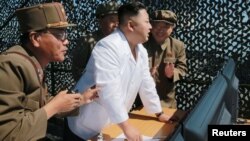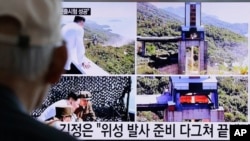North Korea recently celebrated its 68th anniversary and leader Kim Jong Un test-fired the country’s latest submarine-based missile, detonated a fifth nuclear bomb, and conducted a rocket-engine test. The world condemned the provocative actions of the defiant nation.
United States Secretary of State John Kerry, South Korea’s Foreign Minister Yun Byung-se, and Japan’s Foreign Minister Fumio Kishida met ahead of the United Nations General Assembly this week to discuss the situation on the Korean peninsula.
Kerry said the U.S. remained deeply committed to its treaty and defense obligations, as well as to “rolling back the provocative, reckless behavior of the DPRK.”
The secretary continued, "We have said many times that we are prepared to sit down with the DPRK to deal with the issues of non-aggression and peace on the Korean peninsula, of joining the international community, of attracting assistance and economic development, providing North Korea's prepared to talk to the rest of the world about responsible approaches to the question of nuclear weaponry and the nuclear program."
Aggressive program
North Korea doesn’t appear to want to sit down and “roll back” anything, but rather seems to be accelerating their activity.
Speaking on VOA’s Asia Weekly podcast, Harry Kazianis, Director of Defense Studies at the Center for the National Interest has a simple theory as to why North Korea has stepped up its testing schedule.
“I think the technology basically is maturing and the only way to ensure that this technology works is to test it and to test it rigorously,” he said.
Kazianis notes that revisiting history, one will see similar paths taken by the United States and the Soviet Union in the 1950s and ‘60s.
"The only way to make sure that stuff basically works is to continually test it — to make sure that it's accurate," said Kazianis.
Continued international condemnation
The nuclear test in January earned the North Korean leader a strong rebuke from the international community, with the United Nations passing what is typically referred to as the strongest sanctions against the regime.
Many look to China to rein in Kim Jong Un’s provocative behavior, but is that something that’s even possible?
Kazianis says China “definitely can exert pressure, but the question is will they? And the answer is of course, they will not.”
Two days before North Korea’s latest nuclear test, Choe Son Hui, the DPRK’s top nuclear envoy was in Beijing. Adam Cathcart, lecturer in Chinese history at the University of Leeds and editor at SinoNK.com, says the world saw how the dynamics unfolded.
“Judging from the fact that Beijing didn't absolutely explode with anger on the day of the test, I would assume that the North Koreans probably explained the rationale andexplained that it was coming,” he said. “The Korean War itself was unleashed by Kim Il Sung without warning… so this is kind of an ongoing issue between the two sides” with North Korea “doing things by surprise.”
Nonetheless, Cathcart said, “This test appears to have been much better [received by Beijing] than the previous test.”
Kim’s goals
“Who knows what Kim Jong Un wants?” asked Cathcart. “Some people think that maybe he wants this ultimately as a bargaining chip. He basically said this nuclear program is part of constitution. So why would you accrue all of this power and prestige?”
Since 2012, leader Kim has personally presided over nearly every test, essentially becoming “the face” or “brand name” of the program. “For him to suddenly say, ‘Well, you know, yeah it was all just kind of a game so that we can make some kind of a deal…’ I don't see that happening,” said Cathcart.
With Kim not entertaining the thought of giving up his programs, what options remain?
“If you look at all of the available policy options in front of us, an isolation-and-containment strategy really is only the viable alternative,” said Kazianis. “I think we all know the United States and South Korea and Japan are not going to institute regime change,” citing not only the DPRK’s possession of chemical, biological, and nuclear weapons, but the ensuing problems that would create.
“In terms of of sanctions,” Kazianis said, “there is only so much that we can do.”

